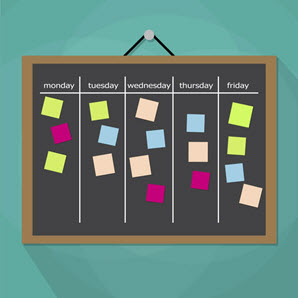Time sense and management tips to the students

Time is a finite resource. Balancing responsibilities at your job, home, and school is not easy. No matter what, you’re always left with the same 24 hours in a day to check items off to-do lists, spend time with family and friends, and unwind. By planning ahead and using your time wisely, you’ll be able to accomplish more and enjoy added free time.
Follow these eight time management tips and strategies to ensure that you meet deadlines, are well prepared for exams, and have time for yourself while pursuing a college degree.
1. Identify Time-Wasters and Set Goals
It’s easy to get distracted. Pay attention to what draws your focus away from your studies and assignments.
- Are you spending too much time checking social media?
- Are you prone to texting and answering personal phone calls while studying?
- Do you find that a lot of time has passed while you aimlessly browse the web?
No matter what is wasting your time, set a goal to not engage in that behavior during dedicated study time. Instead, use those activities as a reward for staying focused and accomplishing the tasks you set out to complete.

Make a list of things to do. Identify time wasters. Set goals for completion.
2. Plan Ahead by Creating a To-Do List
Identify what you need to do, and then prioritize the tasks based on when the assignment is due and how much time you need to complete it. This gives you a set plan for the day. Whether it’s just a list of priorities or a full schedule for the day, having a plan will ensure that you know what to do and when.
Unless there’s a pressing priority, it’s important to also consider what sort of work you’re in the mood to do.
- Do you feel creative? You may want to prioritize working on a writing assignment.
- Do you feel focused? You could spend the day studying for an upcoming exam.

Divide your list into things to do now and things to do later. Set due dates.
3. Tackle Small Tasks to Start
It’s easy to get overwhelmed by large projects and big exams, and the anxiety can make you want to procrastinate. Start with shorter, simpler to-do items and then move on to larger projects or assignments.
- What can you complete in the shortest time and has the fewest dependencies?
- What needs more time or has more complicated workflows?

Prioritize your list by what can be done in a few minutes and what will take longer to complete.
4. Only Do One Thing at a Time
A University of London study showed that those who multitask see a drop in their IQ similar to someone who didn’t sleep the night before. If you’re trying to juggle multiple assignments and tasks, you’ll likely end up being less productive. To combat the urge to multitask, ask yourself:
- What are your most common distractions? (Email, social media, electronics, etc.)
- Can you turn off the devices or applications?
Turn off any devices that you can. And no matter what, don’t switch to another task until the one before it is complete. This may be a hard habit to break, but it’s worth it.

Removing distractions takes discipline and practice. Do one thing at a time, and, if it helps, use a timer to schedule your focus time.
5. Establish Routines
A set routine can also help you accomplish the things you need to do. Is your home quietest in the early morning? You may want to get in the habit of regularly using that time to study or read. The more often you do this, the less you’ll have to think about when you’ll accomplish the tasks you need to finish that day.

Establish routines around the busiest times of the day for you and your family.
6. Use Breaks Wisely
The time between work, classes, activities, and meetings can be used to complete tasks. People who use the Pomodoro Technique, developed in the 1990s, work in short intervals and take short, regular, timed breaks or “Pomodoros." For example, you might use a timer to work in 25-minute sprints, broken up by 5-minute breaks away from your workspace. Every fourth Pomodoro, take a longer break.

The Pomodoro Technique was named after the tomato-shaped timer.
7. Take Time Off
It’s important to take time for yourself. Long study sessions or chunks of time working on assignments should be broken up with time away from screens or textbooks. You need to give your mind a rest.
Many scholars have studied the effects of meditation on reducing effects of stress-induced conditions such as back pain, irritable bowel syndrome, and insomnia. The National Institutes of Health gathered these studies and published them in “Meditation: In Depth,” which includes one study that suggests meditation makes the brain’s ability to process information more efficient.

Meditation can take place anywhere you can find a few minutes of quiet. Search for free meditation apps in your smartphone’s app store.
8. Learn to Delegate
While your significant other, family members, or roommates won’t be able to study for you, you can ask them to help out more around the house while you continue your education. Freeing up a little more time by having others help with household chores and errands will ensure that you can stay focused on your studies and coursework, or that you can take a well-deserved break.

Resist the urge to do it all. What household and routine tasks can you share with your friends and family?



Comments